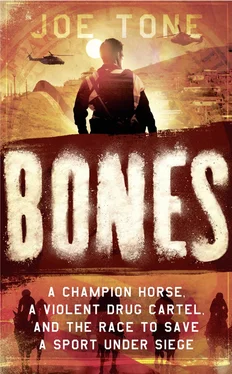In 1992, the year before lawmakers passed NAFTA, Kiko bought a 1958 tractor-trailer and returned to the Mexican side of the border. He started moving loads of raw materials from Nuevo Laredo to the maquiladoras of interior Mexico. But he wasn’t just preparing for NAFTA’s promised impact on U.S.-Mexican trade; he was also betting on the effect both governments refused to acknowledge: the increased flow of drugs across those same borders.
By truck, train, car, and foot, traffic across the border was expected to skyrocket when the law took effect on January 1, 1994. Every vessel that crossed offered an opportunity to satisfy America’s unquenchable thirst for illegal narcotics—cocaine, from the wilds of Colombia but shipped through Mexico; heroin, from the poppy fields of Sinaloa; and weed, from whatever patch of land industrious growers could find. Kiko started using his new truck to transport marijuana.
Not much is known about Kiko’s previous history as a smuggler, if he had any. But he had come up during a golden age of pot smuggling, after America developed its taste for weed but before its government declared war on it. If you grew up poor in Nuevo Laredo, the business, and the connections, came easily whenever you decided you wanted in.
Kiko wanted in. He bought weed from suppliers in Mexico and smuggled it across the river into Laredo, presumably tucked away in his new tractor-trailer. Then he hired couriers and paid them a few thousand bucks a load to transport it to Dallas.
In previous eras, shipping narcotics north on Interstate 35 was the easy part: keep the speed limit and stay inside the lines and no one would bother you. But in the 1970s, the United States Supreme Court had ruled that Border Patrol agents at checkpoints within the country’s borders could stop and question motorists regardless of whether they suspected wrongdoing. Now, at checkpoints like the Laredo North station, located thirty miles north of the border on Interstate 35, agents could stop and question any motorist. And they could pull cars and trucks into hard secondary with only the slightest hint of probable cause.
Kiko’s drivers moved a few hundred pounds of weed at a time. Usually they concealed it amid construction materials in a trailer. Other times, they used a ranch just off the highway to avoid the checkpoint altogether. They paid a few hundred bucks per trip to enter the ranch on one side of the checkpoint and exit on the other.
Kiko was hardly a kingpin. Other Texas smugglers around that time imported ten times what he did. But he made enough to expand his trucking company. He moved back to Nuevo Laredo, sleeping in a small living space behind his office while his wife and kids stayed back in Dallas. He had nine employees, including a bookkeeper, messengers, and drivers who delivered paper, aluminum, and other raw materials to factories across Mexico.
Between legitimate shipping and marijuana smuggling, Kiko was making enough to keep expanding the Treviño clan’s nest in Dallas. He bought new trucks for his shipping business, a new pickup for himself, and a motorcycle for his son.
José, now in his mid-twenties, stuck to bricklaying. He met a woman named Zulema, an American citizen eight years his junior. She had dark-chocolate eyes and wavy black hair, and her round cheeks gave shape to a determined face. She shared José’s Mexican heritage, privilege-free upbringing, and bottomless work ethic. She was just seventeen when they married, around the time Kiko pivoted into smuggling. She gave birth to their first child, Alexandra, a couple of months later.
José became a naturalized citizen and kept working the trowel for whatever contractor would take him. He rose before the sun and put in long days, building homes and schools and stores in and around Dallas. He wanted nothing to do with smuggling. If he lived with some festering indignation over his family’s economic abandonment—by his father, by his fatherland, by his adopted homeland—he never expressed it to the people around him. Instead, he was building a life the way he stacked bricks in the morning shade: slowly and dutifully, actively rejecting the smuggling heritage of his hometown.
But occasionally, big brother Kiko called in a favor.
José likely longed to say no. But he was lugging that word of rejection uphill. He possessed a deep sense of what social scientists call “familism,” a commitment to family over self. Social scientists routinely pin that quality on immigrants, especially Mexican ones, citing a cocktail of factors: religion, large family size, and economic necessity. And maybe immigrants do rely more heavily on family, as a tool against marginalization, using flexibility and fluidity as antidotes to systematically limited opportunity. But also, it’s just what some families do: They stick the hell together. They say yes.
The Treviño brothers’ early years in Dallas would have tantalized those familism-obsessed social scientists. The siblings found each other work, built each other homes, shared cars, and cared for each other’s kids. This unflagging devotion to family may or may not dissipate in future generations, but José’s generation was the first. If big brother asked, José said yes.
Whenever Kiko’s drug couriers arrived in Dallas with the weed, they would hole up at the La Quinta, the Travelers, or some other access-road dump, waiting for one of Kiko’s workers to pick up the delivery. Before they returned to Laredo, they wanted their few-thousand-dollar delivery fee. A few times, they beeped José to collect it. He got the cash from Kiko and delivered it to the motels.
Kiko’s enterprise didn’t last long. Late in 1993, before NAFTA even took effect, Kiko’s couriers tried to pass through the Laredo North checkpoint at three-thirty in the morning. A drug-sniffing dog named Wondo perked up, leapt onto the tires, sniffed, leapt back down, and sat up straight. The agents knew what that meant, so they opened the trailer, and the dog started jumping like, Let me in . He was an old dog, so for him to be jumping, that meant something.
The agents waved the truck into secondary. The trailer was stuffed with Saltillo tile, destined for the kitchen of some Spanish-style McMansion. The agents hoisted themselves in and clinked their way to the back, following Wondo. That’s where they found the duffel bags, stuffed with 280 pounds of cellophane-wrapped marijuana.
Kiko went to trial in 1995. José wasn’t indicted, but his name did come up a couple of times. That probably explained why José wasn’t in the courtroom to see Kiko sentenced to twenty years—two decades in a Colorado federal prison for moving a drug that, by the time he got out, would be legal in the state where he served his time.
With Kiko in prison, the Treviños kept grinding. Zulema earned a high-school diploma online and slogged through the best work she could find. She made $6 an hour working food service at a middle school; $6.50 as a McDonald’s crew member; and, now, $500 a week working full-time for a temp agency.
José found a steady masonry gig with a residential contractor in the suburbs, and he stuck it out there for six long years. In 2007, he landed a full-time job with a contractor who did brickwork on some of the city’s most prestigious projects: the new basketball arena at Southern Methodist University; the new campus of Booker T. Washington High School, one of the country’s best performing-arts schools; and the new Cowboys Stadium, a monument to American excess fans dubbed “the Death Star.”
José surely knew he worked harder than his paychecks suggested. The incomes of immigrants were systematically stubborn, especially in Texas, where so-called right-to-work laws suppressed union organizing and wages. Texas bricklayers made less than those in most every other state, and 50 or 60 percent less than those in Illinois, California, and New York.
Читать дальше












